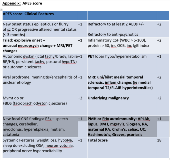Antibody Prevalence in Epilepsy Before Surgery (APES)
Abstract number :
2.124
Submission category :
4. Clinical Epilepsy / 4B. Clinical Diagnosis
Year :
2018
Submission ID :
502145
Source :
www.aesnet.org
Presentation date :
12/2/2018 4:04:48 PM
Published date :
Nov 5, 2018, 18:00 PM
Authors :
Sarah Tymchuk, Stanford University; John Barry, Stanford University School of Medicine; Srikanth Muppidi, Stanford University; and Scheherazade Le, Stanford University
Rationale: There is a small but growing recognition of autoimmune causes of focal epilepsy over the past 10-15 years [Berkovic 2014]. However, immune-mediated causes of epilepsy are not systematically assessed before epilepsy surgery. The prevalence of neurologic antibodies ranges from 11% in older studies to 35% in newer studies [McKnight 2005; Brenner 2013; Dubey 2017], however, the significance of some antibodies is still uncertain. Dubey recently described a clinical APE (antibody prevalence in epilepsy) score = 4 in patients with focal epilepsy with a sensitivity and specificity of 82% to predict positive serum antibodies [Dubey 2017]. Methods: We are prospectively studying antibody prevalence in patients =18 years old with drug-resistant focal epilepsy with no known cause before surgery. We exclude patients with generalized epilepsy or with definitive immune-mediated epilepsy. A serum paraneoplastic panel and anti-TPO antibodies are collected. A clinical APES (Antibody Prevalence in Epilepsy before Surgery) score is calculated for each subject (See appendix). The APE and RITE scores are also tabulated [Dubey 2017]. The primary outcome is the proportion of patients with a positive serum antibody status. The secondary outcome is the sensitivity and specificity of the APES and APE scores to predict positive CNS specific antibodies. Results: We have enrolled 22 subjects and all but 2 patients have had epilepsy for > 1 year; average duration of epilepsy was 11 years±11 years. One patient was excluded because he had definitive immune-mediated seizures. Results are pending for 6 patients. Eight out of 16 (50%) subjects have at least one positive antibody including GAD-65 at high titers (n=3), VGKC with confirmed LGI-1 (n=1), anti-TPO (n=4), AChR (n=2). Four out of 16 (25%) subjects had CNS specific antibodies after non-specific isolated anti-TPO antibodies and AChR antibodies were excluded. The sensitivity and specificity of APES =4 to predict positive serum antibody status was 87.5% and 14.3%. The sensitivity and specificity of APES = 4 to predict positive CNS specific serum antibodies are 100% and 18.2% respectively. The sensitivity and specificity of APE = 4 to predict positive serum antibody status was 50% and 28.6%. The sensitivity and specificity of APE =4 to predict CNS specific serum antibodies was 80% and 45.5%. The RITE score was =7 in 4/16. Conclusions: Our study population is primarily composed of chronic drug-resistant focal epilepsy patients undergoing a pre-surgical workup for epilepsy. Similar to other studies, 25% had CNS specific serum antibodies. The patient with LGI-1 antibodies had an explosive onset of refractory seizures and episodic hyperhidrosis but he did not have prominent cognitive features nor obvious faciobrachial dystonic seizures and therefore had a mild phenotype of limbic encephalitis. He has responded to high dose oral steroids even though he had a low RITE score of 5. We will continue recruiting subjects for a total of 18 months. If the APES or APE score can predict CNS specific positive antibody status in medically refractory pre-surgical focal epilepsy patients, it would be a useful tool to identify patients who may benefit from a workup for autoimmune causes of epilepsy and a trial of immunotherapy before invasive studies or therapies are considered.ReferencesBerkovic. The hidden genetics of epilepsy – a clinically important new paradigm. Nat Rev Neurol 2014.Brenner. Prevalence of neurologic autoantibodies in cohorts of patients with new and established epilepsy. Epilepsia 2013.McKnight. Serum antibodies in epilepsy and seizure associated disorders. Neurology 2005.Dubey. Predictive models in the diagnosis and treatment of autoimmune epilepsy. Epilepsia 2017. Funding: None

.tmb-.png?Culture=en&sfvrsn=cdb88e09_0)